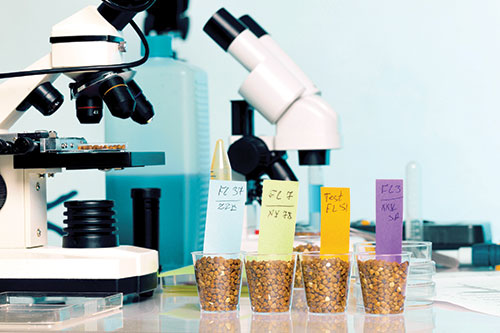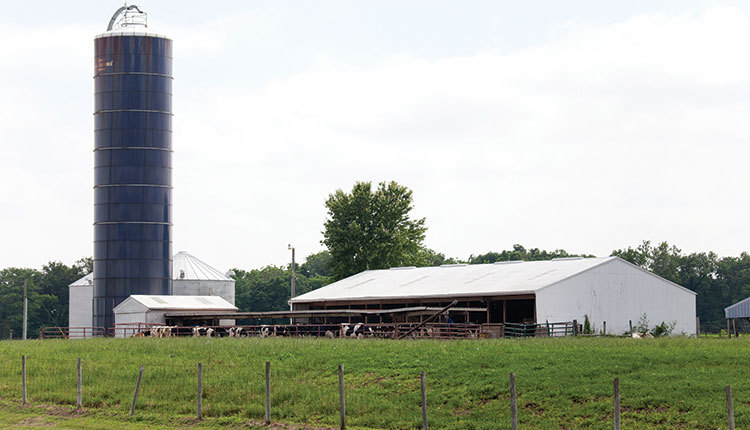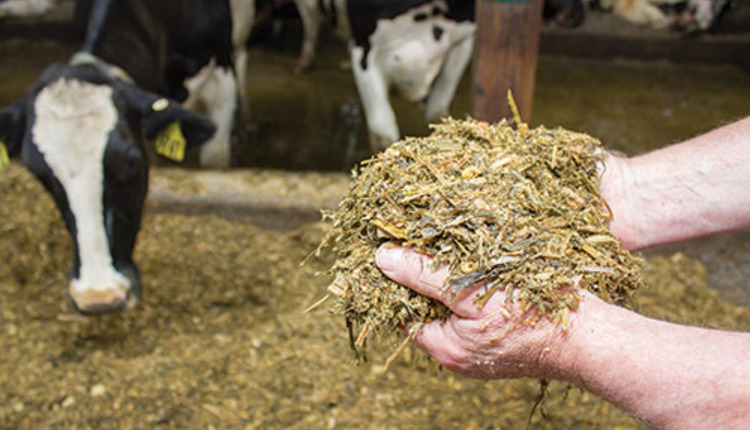The author is a dairy nutrition consultant for Central Connecticut Cooperative Farmers, who previously managed large dairies in California and Hawaii. Many thanks to Margaret Smith of Cornell University for graciously allowing the author to draw information from her proceedings presented at the 2014 Cornell Nutrition Conference.

There are two sides to every debate. Those in favor of genetically engineered crops see it as a tool to feed a growing world. Those opposed question its future impact on mankind.
The dairy industry has found itself squarely in the middle of the debate over genetically engineered (GE) crops and feeds. A growing segment of the population now prefers not to consume dairy products produced by cows that have consumed feeds containing genetically engineered ingredients. Also referred to as genetically modified organisms - GMO - the concern is part of the larger all natural, sustainable and organic movements that have emerged over the past decades. The advocates of non-GMO assert that cows consuming GMO-free feeds are less stressed and better cared for, resulting in healthier dairy products, which ultimately makes the dairy industry more environmentally friendly.
Here in New England the vast majority of the discussions over GE occur within the farmers market/organic market settings where emotions and opinions of food quality and nutrition run high. At the heart of the debate is the public's concern over the effects that GE crops may have on the environment and food safety. Three key questions have emerged over GE:
Others see GE as presenting unnecessary risks to the food supply and human health, placing the control of something so basic and necessary to the survival of humankind in the hands of corporations. The new technologies producing GE foods are seen as risky, producing foods that are "unnatural."
Trait selection isn't new
Margaret Smith, a geneticist specializing in plant breeding at Cornell University, explains that genetic engineering is a logical extension of what plant breeders have always done. Our domesticated crops and animals are already "not natural" due to centuries of crossbreeding and hybridization. Genetic engineering is a new tool for breeding improved crops.
Modern GE technology moves beyond traditional crossbreeding and hybridization, providing faster improvement and crops that can stand up to harsher growing conditions and be brought to market much more quickly. Genetic engineering alters the properties of organisms by moving specific genes between organisms or by modifying existing genes. Genetic engineering can also correct a defective gene and enable plants to turn a gene on or off.
This is exactly what has been done to a number of the crops that dairy farmers use to feed cows. Corn, soybeans, canola, cotton and alfalfa now have both herbicide tolerance and insecticide traits built into them. In tropical regions, papaya and squash have been genetically engineered to resist viruses. All of this has enabled farmers to reduce their input costs such as labor, herbicides and pesticides, reducing the chances of crop failure and improving yields.
The controversy over GE arises because the general population has little understanding of plant breeding and the processes involved. Adding to the confusion, the term "GMO" implies that our crops were not previously genetically altered prior to modern GE technology. The term has been embraced by the mainstream media as "a bad thing" and essentially puts the monkey on the back of the pro-GMO people to explain that it has been around for many years with no food safety issues.
Fear drives questions
Cornell's Smith explains that a body of over 100 independently-funded studies has not revealed evidence of any food or feed safety concerns with currently commercialized GE crop varieties. Those few studies that have purported to show problems from feeding GE crops have been very widely discredited by experienced scientists for their poor design, inappropriate analysis and other scientific problems. Nevertheless, the fear still exists that a scientist will make a mistake and create a disaster.
Farmers everywhere have been bombarded by the GMO/non-GMO controversy leaving all to question the environmental impacts of GE crops. A National Research Council study showed that adoption of GE varieties resulted in positive environmental impacts from reduced insecticide usage and less need for soil tillage. Although impacts vary from farm to farm due to differences in environment, soils and production systems, this study found that many farmers had benefited economically from GE crop varieties.
The results of herbicide use are less clear. While herbicides are still being used with GE crops, it appears that there's a shift toward using less toxic herbicides in place of the more environmentally undesirable herbicides. Smith explains that opponents of GE crops can point to data showing that additional GE crop adoption has resulted in more herbicide use. At the same time, the advocates of GE crops can point to data showing that more environmentally-friendly herbicides are being used, and reduced tillage (with its environmental benefits) has been promoted.
Additional controversy over GE focuses on the public's right to know if their food contains GMOs. Consumers question whether GE crop varieties that find their way into our food supply are safe and whether GE technology has or could introduce allergens into common foods. Once again, the problem lies with misinformation about what GE foods are and are not. Many ingredients in our foods are highly refined and purified, having no protein or DNA which makes them indistinguishable from and chemically identical to a non-GMO variety.
Who should own genetics?
Modern genetic engineering also begs the question of whether it's prudent to allow just a handful of companies to "own" crop genetics. Some may fear that large companies are in the GE business solely to enrich themselves. Agriculture is no longer the simple business of farmers planting crops (or raising animals) for local consumption and hoping the weather doesn't wipe out their livelihood. Agriculture has evolved into big business with large private sector companies spending millions of dollars to improve nutrition and standards of living for millions of people worldwide.
Genetic engineering in agriculture is a work in progress, and our descendants a century from now will be very thankful that this technology was developed and put to good use. Regardless of what side of the debate you come down on, this is a delicate subject, and the dairy industry must keep a close eye on consumer opinions and proactively affirm that GE/GMO has many attributes that will benefit mankind.
This article appears on page 447 of the July 2015 issue of Hoard's Dairyman.
Return to the Hoard's Dairyman feature page.

The dairy industry has found itself squarely in the middle of the debate over genetically engineered (GE) crops and feeds. A growing segment of the population now prefers not to consume dairy products produced by cows that have consumed feeds containing genetically engineered ingredients. Also referred to as genetically modified organisms - GMO - the concern is part of the larger all natural, sustainable and organic movements that have emerged over the past decades. The advocates of non-GMO assert that cows consuming GMO-free feeds are less stressed and better cared for, resulting in healthier dairy products, which ultimately makes the dairy industry more environmentally friendly.
Here in New England the vast majority of the discussions over GE occur within the farmers market/organic market settings where emotions and opinions of food quality and nutrition run high. At the heart of the debate is the public's concern over the effects that GE crops may have on the environment and food safety. Three key questions have emerged over GE:
- By modifying our foods on a genetic level, are we permanently altering and unknowingly damaging select foods that may result in irreparable harm to the human race?
- Are people's civil rights being violated as genetically engineered foods are being introduced into the food chain?
- What are the economic and ethical ramifications as a growing percentage of our food supply is being controlled by a handful of mega-companies that have the resources to manipulate nutrition through genetic engineering?
Others see GE as presenting unnecessary risks to the food supply and human health, placing the control of something so basic and necessary to the survival of humankind in the hands of corporations. The new technologies producing GE foods are seen as risky, producing foods that are "unnatural."
Trait selection isn't new
Margaret Smith, a geneticist specializing in plant breeding at Cornell University, explains that genetic engineering is a logical extension of what plant breeders have always done. Our domesticated crops and animals are already "not natural" due to centuries of crossbreeding and hybridization. Genetic engineering is a new tool for breeding improved crops.
Modern GE technology moves beyond traditional crossbreeding and hybridization, providing faster improvement and crops that can stand up to harsher growing conditions and be brought to market much more quickly. Genetic engineering alters the properties of organisms by moving specific genes between organisms or by modifying existing genes. Genetic engineering can also correct a defective gene and enable plants to turn a gene on or off.
This is exactly what has been done to a number of the crops that dairy farmers use to feed cows. Corn, soybeans, canola, cotton and alfalfa now have both herbicide tolerance and insecticide traits built into them. In tropical regions, papaya and squash have been genetically engineered to resist viruses. All of this has enabled farmers to reduce their input costs such as labor, herbicides and pesticides, reducing the chances of crop failure and improving yields.
The controversy over GE arises because the general population has little understanding of plant breeding and the processes involved. Adding to the confusion, the term "GMO" implies that our crops were not previously genetically altered prior to modern GE technology. The term has been embraced by the mainstream media as "a bad thing" and essentially puts the monkey on the back of the pro-GMO people to explain that it has been around for many years with no food safety issues.
Fear drives questions
Cornell's Smith explains that a body of over 100 independently-funded studies has not revealed evidence of any food or feed safety concerns with currently commercialized GE crop varieties. Those few studies that have purported to show problems from feeding GE crops have been very widely discredited by experienced scientists for their poor design, inappropriate analysis and other scientific problems. Nevertheless, the fear still exists that a scientist will make a mistake and create a disaster.
Farmers everywhere have been bombarded by the GMO/non-GMO controversy leaving all to question the environmental impacts of GE crops. A National Research Council study showed that adoption of GE varieties resulted in positive environmental impacts from reduced insecticide usage and less need for soil tillage. Although impacts vary from farm to farm due to differences in environment, soils and production systems, this study found that many farmers had benefited economically from GE crop varieties.
The results of herbicide use are less clear. While herbicides are still being used with GE crops, it appears that there's a shift toward using less toxic herbicides in place of the more environmentally undesirable herbicides. Smith explains that opponents of GE crops can point to data showing that additional GE crop adoption has resulted in more herbicide use. At the same time, the advocates of GE crops can point to data showing that more environmentally-friendly herbicides are being used, and reduced tillage (with its environmental benefits) has been promoted.
Additional controversy over GE focuses on the public's right to know if their food contains GMOs. Consumers question whether GE crop varieties that find their way into our food supply are safe and whether GE technology has or could introduce allergens into common foods. Once again, the problem lies with misinformation about what GE foods are and are not. Many ingredients in our foods are highly refined and purified, having no protein or DNA which makes them indistinguishable from and chemically identical to a non-GMO variety.
Who should own genetics?
Modern genetic engineering also begs the question of whether it's prudent to allow just a handful of companies to "own" crop genetics. Some may fear that large companies are in the GE business solely to enrich themselves. Agriculture is no longer the simple business of farmers planting crops (or raising animals) for local consumption and hoping the weather doesn't wipe out their livelihood. Agriculture has evolved into big business with large private sector companies spending millions of dollars to improve nutrition and standards of living for millions of people worldwide.
Genetic engineering in agriculture is a work in progress, and our descendants a century from now will be very thankful that this technology was developed and put to good use. Regardless of what side of the debate you come down on, this is a delicate subject, and the dairy industry must keep a close eye on consumer opinions and proactively affirm that GE/GMO has many attributes that will benefit mankind.










